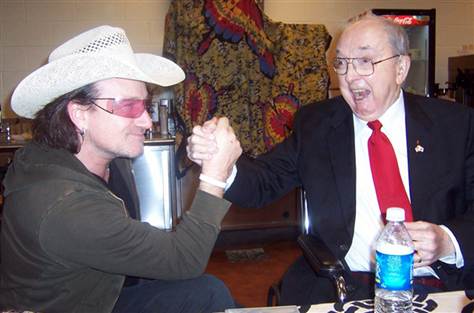You have to rationalize a lot if you’re going to be Bono. You have to make allowances. You can’t nitpick. You need to embrace scoundrels as well as the sainted. You actually have to convince yourself that the scoundrels have a saint within them. You must believe in large corporations–even own a stake in some–that don’t treat the downtrodden particularly well, the very downtrodden you say you stand with. It’s a tangled web you weave. You look at it as playing the inside game to try to improve the world, making small sacrifices to benefit the big picture.
But Harry Browne, in The Frontman, his excoriation of U2’s lead singer, looks at it differently. From Terry Eagleton in the Guardian:
“One result of his campaigning has been a kind of starvation chic. In this impressively well-researched polemic, Browne recounts how Ali Hewson, Bono’s wife, praised the work of her company’s Paris-based clothes designer for being influenced by dusty African landscapes. She admired ‘the way some of the clothes look like they’ve been worn before and sort of restitched … to incorporate the continent, in a sense.’ Hewson’s Messianic husband, or ‘the little twat with the big heart.’ as Viz magazine once dubbed him, has been trying to incorporate Africa into his image for a good few decades now. Like Geldof, he inherited the social conscience of the 1960s without its political radicalism, which is why he has proved so convenient a front man for the neo-liberals.
In fact, as Browne points out, he has cosied up to racists such as Jesse Helms, whitewashed architects of the Iraqi adventure such as Tony Blair and Paul Wolfowitz, and discovered a soulmate in the shock-doctrine economist Jeffrey Sachs. He has also brownnosed the Queen, sucked up to the Israelis, grovelled at the feet of corporate bullies and allied himself with rightwing anti-condom US evangelicals in Africa. The man who seems to flash a peace sign every four seconds apparently has no problem with the sponsorship of the arms corporation BAE. His consistent mistake has been to regard these powers as essentially benign, and to see no fundamental conflict of interests between their own priorities and the needs of the poor. They just need to be sweet-talked by a charmingly bestubbled Celt. Though he has undoubtedly done some good in the world, as this book readily acknowledges, a fair bit of it has been as much pro-Bono as pro bono republico.
If Bono really knew the history of his own people, he would be aware that the Great Irish Famine of the 1840s was not the result of a food shortage. Famines rarely are. There were plenty of crops in the country, but they had to be exported to pay the landlords’ rents. There was also enough food in Britain at the time to feed Ireland several times over. What turned a crisis into a catastrophe was the free market doctrine for which the U2 front man is so ardent an apologist. Widespread hunger is the result of predatory social systems, a fact that Bono’s depoliticising language of humanitarianism serves to conceal.
Browne’s case is simple but devastating.” (Thanks Browser.)

